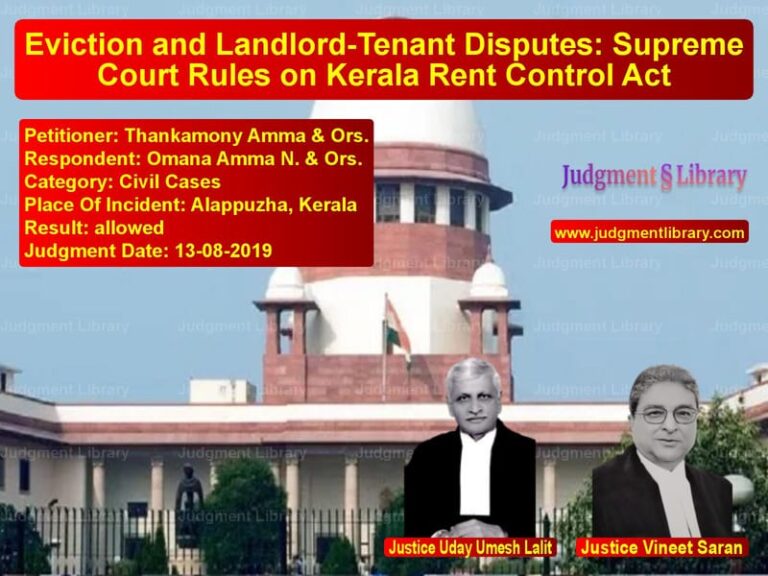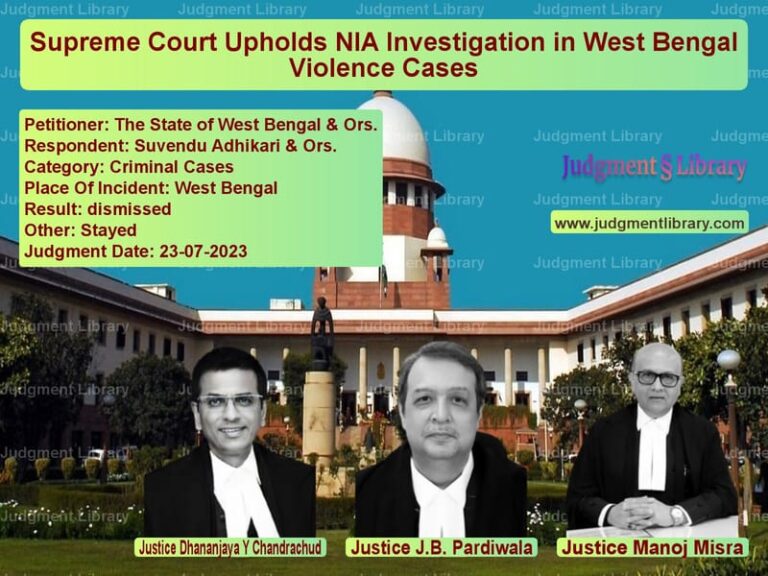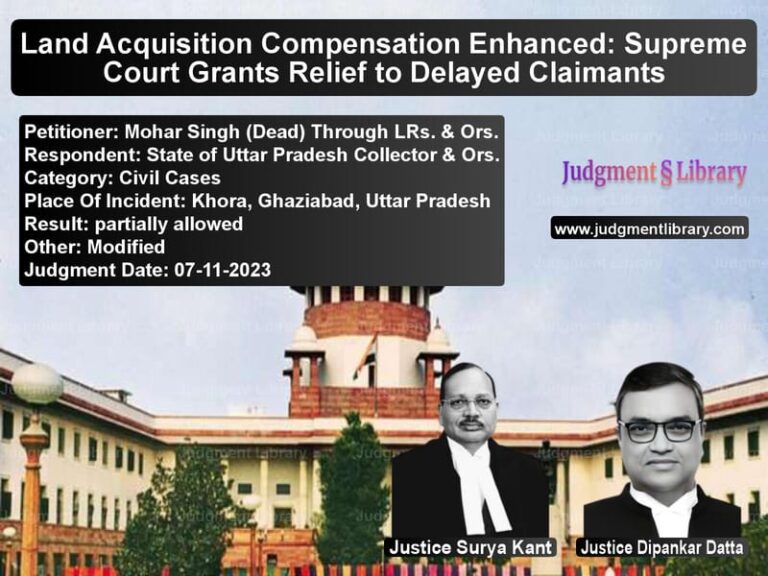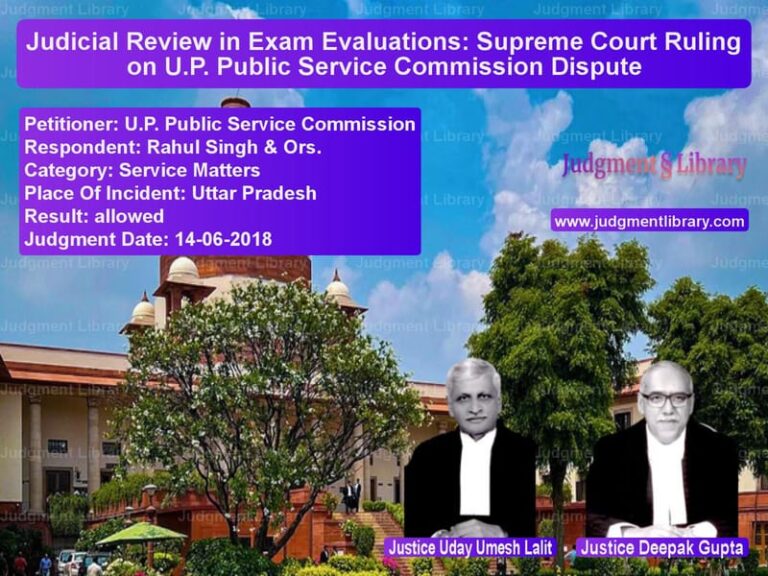Supreme Court Upholds Murder Conviction in Balu Sudam Khalde Case
The case of Balu Sudam Khalde and Another vs. The State of Maharashtra revolves around a tragic incident that took place on April 1, 2001, in Pune, Maharashtra. The Supreme Court of India, in its judgment dated March 29, 2023, upheld the conviction of the appellants under Section 302 read with Section 34 of the Indian Penal Code (IPC). The case highlights crucial aspects of criminal law, including eyewitness testimony, forensic evidence, and legal principles related to murder and culpable homicide. This blog delves into the details of the case, the arguments presented by both sides, and the reasoning behind the court’s decision.
Background of the Case
According to the prosecution, on April 1, 2001, at around 11:15 PM, the deceased Abbas Baig and his friend Asgar Shaikh were engaged in a conversation when the appellant Santosh Khalde, along with a few others, passed by. A verbal altercation took place between Abbas Baig and Santosh Khalde. Shortly afterward, Santosh returned with his co-accused, including Balu Sudam Khalde, and launched a brutal attack on Abbas Baig and Asgar Shaikh. The accused used a sickle and a sword in the assault, leading to severe injuries to Abbas Baig, who later succumbed to them. The First Information Report (FIR) was lodged within hours, leading to the arrest of the accused.
Trial Court Proceedings
The case was tried before the Additional Sessions Judge, Pune. The prosecution relied on multiple eyewitness accounts, forensic evidence, and the discovery of the murder weapons to establish the guilt of the accused. The trial court found the appellants guilty under Section 302 read with Section 34 IPC and sentenced them to life imprisonment with a fine.
Read also: https://judgmentlibrary.com/supreme-court-acquits-appellant-in-robbery-case-due-to-lack-of-evidence/
Charges Framed Against the Accused
The trial court framed the following charges:
- Committing murder with common intention under Section 302 read with Section 34 IPC.
- Voluntarily causing hurt to the complainant under Section 323 IPC.
- Using deadly weapons to cause injuries under Section 324 IPC.
- Intentional insult to provoke breach of peace under Section 504 IPC.
Evidence Presented by the Prosecution
The prosecution relied on eyewitness testimonies, medical reports, and forensic evidence, including:
- Testimonies of key eyewitnesses, including PW1 (complainant) and PW3 (a rickshaw driver who transported the victim).
- Medical examination of the deceased, which revealed multiple stab wounds.
- Forensic reports confirming the presence of human blood on the weapons recovered from the accused.
Arguments of the Appellants
The appellants challenged their conviction on the following grounds:
- The prosecution’s witnesses were biased as they were friends or relatives of the deceased.
- The complainant’s claim of being injured was not corroborated by any medical records.
- The discovery of the weapons was unreliable since the panch witnesses did not confirm the recovery process.
- Even if the incident took place as alleged, it did not amount to murder but rather culpable homicide not amounting to murder.
Arguments of the Respondent (State)
The State, representing the prosecution, countered these arguments by stating:
- The testimonies of the eyewitnesses were consistent and corroborated by forensic evidence.
- The injuries sustained by the deceased were inflicted using dangerous weapons, indicating an intention to kill.
- The accused acted in a brutal manner and took undue advantage of the situation.
- The case did not fall under Exception 4 of Section 300 IPC, as the accused had acted with cruelty.
Supreme Court’s Analysis and Judgment
The Supreme Court dismissed the appellants’ plea for a reduced sentence and upheld their conviction. The court made the following observations:
- Eyewitness testimonies were credible and corroborated by medical and forensic evidence.
- The nature of injuries inflicted using a sickle and a sword indicated a clear intention to kill.
- There was no sudden provocation or heat of passion that could justify reducing the charge to culpable homicide not amounting to murder.
- The appellants’ actions were deliberate and planned, ruling out any possibility of a spontaneous fight.
The Supreme Court further observed:
“The accused inflicted as many as nine blows with dangerous weapons on the deceased, who was unarmed and defenseless. The brutal nature of the attack indicates a clear intention to cause death, bringing the case under Section 302 IPC.”
Read also: https://judgmentlibrary.com/supreme-court-grants-bail-in-ndps-case-right-to-speedy-trial-upheld/
Final Judgment
The Supreme Court dismissed the appeal and directed the appellants to surrender within two weeks to serve their sentence.
The judgment reinforces the importance of thorough forensic analysis and reliable eyewitness testimonies in criminal cases. It also serves as a precedent for interpreting the difference between murder and culpable homicide not amounting to murder.
Conclusion
The case of Balu Sudam Khalde and Another vs. The State of Maharashtra highlights key aspects of criminal law and the importance of fair trial procedures. The Supreme Court’s ruling affirms the lower courts’ findings and ensures justice for the victim. The judgment also clarifies the application of Section 300 IPC and the circumstances under which a murder charge is justified.
Petitioner Name: Balu Sudam Khalde and Another.Respondent Name: State of Maharashtra.Judgment By: Justice J.B. Pardiwala, Justice Sudhanshu Dhulia.Place Of Incident: Pune, Maharashtra.Judgment Date: 29-03-2023.
Don’t miss out on the full details! Download the complete judgment in PDF format below and gain valuable insights instantly!
Download Judgment: balu-sudam-khalde-an-vs-state-of-maharashtra-supreme-court-of-india-judgment-dated-29-03-2023.pdf
Directly Download Judgment: Directly download this Judgment
See all petitions in Murder Cases
See all petitions in Bail and Anticipatory Bail
See all petitions in Judgment by J.B. Pardiwala
See all petitions in Judgment by Sudhanshu Dhulia
See all petitions in dismissed
See all petitions in supreme court of India judgments March 2023
See all petitions in 2023 judgments
See all posts in Criminal Cases Category
See all allowed petitions in Criminal Cases Category
See all Dismissed petitions in Criminal Cases Category
See all partially allowed petitions in Criminal Cases Category







